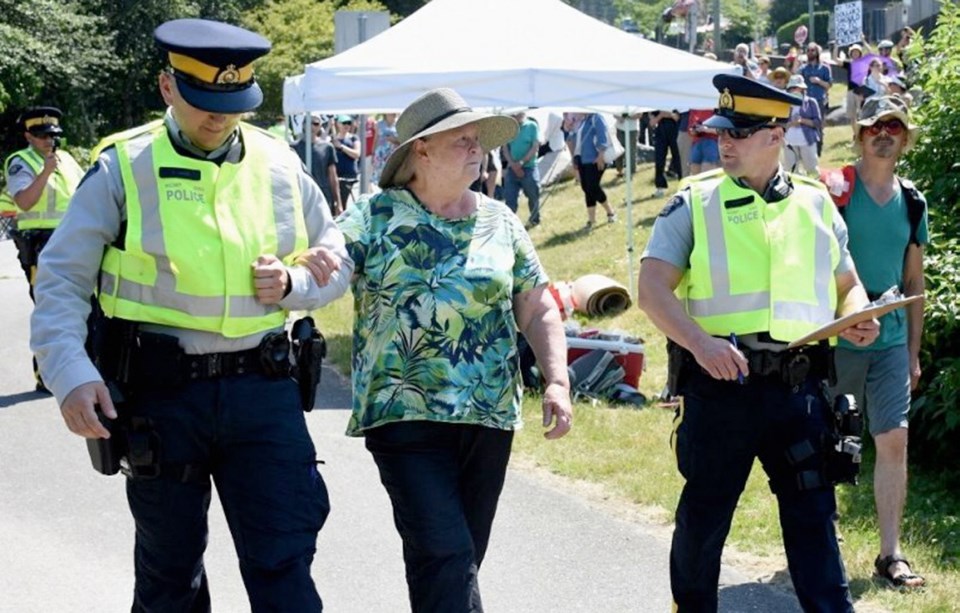VANCOUVER — Two protesters arrested at a Burnaby site of the Trans Mountain pipeline expansion project have received the first jail terms imposed for defying a court injunction ordering opponents to not disrupt construction work.
Laurie Embree, who was arrested on June 19, and Constance Lasheras, who was arrested on June 30, were each handed seven-day jail sentences after pleading guilty to criminal contempt of court in B.C. Supreme Court.
Before the sentences on Tuesday, the 86 protesters who had either pleaded guilty or were found guilty following a trial had been sentenced to either fines or community work service.
The first protesters were arrested in March, after the injunction was imposed on March 15. But the large-scale civil disobedience continued, and Crown counsel warned they would seek a seven-day jail sentence for anyone arrested after May 28.
In imposing sentence on Embree and Lasheras, Justice Kenneth Affleck said that although the pace of arrests — so far 214 people have been charged with contempt — has declined as the months had gone by, he couldn’t be confident there will be no further organized defiance of the injunction.
The two defendants could have lawfully and peacefully protested the pipeline project but instead chose to disobey the law in order to gain publicity for a cause in which they strongly believed, said the judge.
“That is not a basis on which anyone can expect to defy the law without any consequence,” said the judge.
Affleck said that while he had increased the fines and the number of hours of community work service imposed on protesters over time, it had not had an adequate deterrent effect.
“I am not persuaded that either of the persons before me today are likely to repeat their contempt, but I am concerned that there needs to be a general deterrence,” he said. “It is regrettable that prison sentences must be imposed in the circumstances of these proceedings, but I am satisfied that that must now be the outcome.”
Earlier, Crown counsel Monte Rattan told the judge that the continuing violation of the injunction at the site had called into question the effectiveness of the court’s order and the rule of law.
He said Embree in particular had been warned that if she didn’t stop blocking the site, she would face a jail term, but she did not stop, so nothing less than a jail term would be appropriate in the circumstances.
Rattan said there was no reason to believe that the protests had come to an end and in fact the Crown understood that further protests were expected later Wednesday.
He said the court should not “throw up its hands and accept” the lawlessness of the well-organized protesters.
Embree, who was representing herself and did not have a lawyer, was asked by the judge whether she wished to make submissions on whether a jail term was a fit sentence.
She chose instead to attack the injunction, which she called an unjust law.
“Our judicial system is still being manipulated by rich and powerful people that have the influence to make our legal system work for them,” Embree, 70, told the judge. “I truly believe that when we have laws that support injustice, it is the duty of all good men and women to stand up and challenge those laws.”
Lasheras told the judge that she pleaded guilty to criminal contempt of court at the earliest opportunity but did not consider herself to be a criminal.
“I believe the Crown’s presentation of a jail sentence to be unreasonable and unjust. I’ve heard that there were no arrests in July. That leads me to believe that whatever your Lordship has imposed as law has been respected.”
Lasheras, who is Aboriginal, said her intent was not to call into question the court’s authority but to oppose the pipeline.
“I am a mother and I worry for the future of my children. I believe climate change is very real and as a society we must make a shift away from fossil fuels.”
To loud clapping in the packed Vancouver courtroom, the two defendants were taken away into custody.



